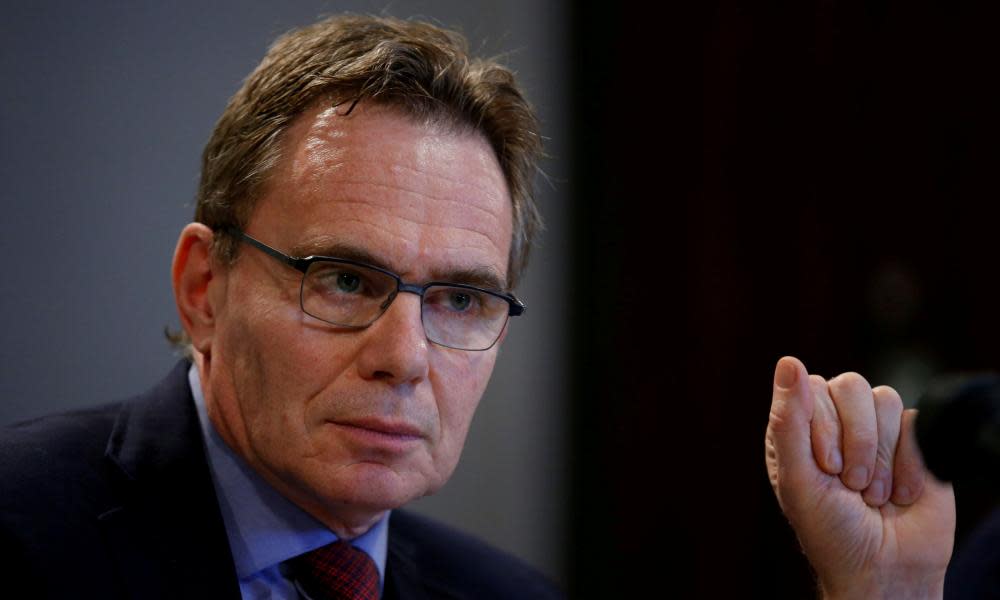BHP shareholder vote raises pressure to quit Minerals Council

More than one in five shareholders of mining giant BHP have backed a resolution calling on the company to resign its membership of any industry associations whose advocacy is “inconsistent” with the Paris climate change agreement.
BHP’s board recommended shareholders vote against the resolution at its annual meeting in London, but 22% of shareholders voted in favour, with another 7% abstaining.
While the resolution failed, campaigners are seeing the strength of the vote as a sign pressure is building on both BHP and the Minerals Council of Australia to bring their advocacy in line with the Paris goal of keeping global heating “well below 2C”.
In the spotlight is BHP’s membership of the Minerals Council and the associated Coal 21 – an industry-funded group that was set up to develop lower-emissions technology but which has spent millions on pro-coal advertising.
Related: Minerals Council says it will release a 'climate action plan' next year
The resolution recommended BHP suspend memberships of any industry group which, since January 2018, had carried out advocacy that “demonstrated, on balance, inconsistency with the Paris agreement’s goals.”
In a speech before the vote, BHP’s CEO, Andrew Mackenzie, said mining trade associations “deserve our full engagement”.
He said: “The move to renewables demands a multifold increase in the production of metals in the decades ahead, which makes mining one of the most vital components of our low-carbon future.
“At a time of increased focus on local solidarity, protection and intervention, in response to increased insecurity and global changes, it’s our participation in industry associations which can contribute to the more global solutions also required for a more progressive world.”
He said a taskforce he led across the mining industry was working to make “our vehicles greener and safer” and that this “typifies the vast bulk of the work of all the trade associations we join and we work tirelessly to make sure this kind of work is their major and predominant role.”
Sign up to receive the top stories from Guardian Australia every morning
In a July speech, Mackenzie said the world’s dependence on fossil fuels “carries risks with it that could be existential”.
In its notice to shareholders before the meeting, BHP reiterated it was still reviewing its industry association memberships, with the outcomes of the review to be released before the end of 2019. The scope of that review had changed from a previous review to include the company’s membership of Coal 21.
A previous 2017 review saw BHP leave the World Coal Association but staying with the Minerals Council to work with it on new climate and energy policy positions.
Brynn O’Brien, executive director of the Australasian Centre for Corporate Responsibility, which organised the resolution, described the vote as “phenomenal” and said it showed a transformation was under way.
The centre argued in supporting statements to the meeting that the Minerals Council, Coal 21, and other industry groups BHP was a member of had carried out advocacy that was not consistent with the Paris goals.
Related: Australians reject Coalition attacks on businesses promoting social issues
O’Brien said: “That companies should suspend funding to organisations that undertake lobbying counter to the goal of a habitable planet is an idea whose time has well and truly come.
“BHP should reconsider its position in advance of the BHP Group Ltd AGM in Sydney on 7 November.”
“Every single trade association that lobbies to undermine the goals of the Paris Agreement is on notice: your time is up.”
Earlier this month, Australia’s biggest superannuation fund warned the MCA its updated climate policy did not go far enough in explaining how its members were working towards climate goals.
The Minerals Council has pledged to release a “climate action plan” in 2020 that its chief executive, Tania Constable, said would “support strong and innovative action by Australia’s world-leading minerals sector to address human-induced climate change.”
In September, a report from UK-based thinktank InfluenceMap named the Minerals Council of Australia as “one of the top 10 most obstructive trade associations” globally on climate policy.

 Yahoo News
Yahoo News 
